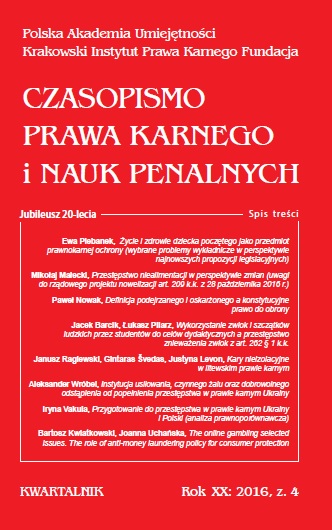Życie i zdrowie dziecka poczętego jako przedmiot prawnokarnej ochrony (wybrane problemy wykładnicze w perspektywie najnowszych propozycji legislacyjnych)
Life and health of a conceived child as an object of protection by criminal law (selected problems concerning legal interpretation in the scope of new legislative proposals)
Author(s): Ewa PlebanekSubject(s): Criminal Law
Published by: Polska Akademia Umiejętności / Krakowski Instytut Prawa Karnego Fundacja
Keywords: crimes against life and health; Act on infertility treatment; in vitro fertilization; death of a conceived child; termination of pregnancy; abortion
Summary/Abstract: Artykuł zawiera dogmatyczną analizę norm prawa karnego odnoszących się do ochrony życia i zdrowia istoty ludzkiej w prenatalnym okresie rozwoju. Punktem wyjścia dla prowadzonych rozważań jest proponowana definicja „dziecka poczętego” zawarta w obywatelskim projekcie ustawy o zmianie ustawy o planowaniu rodziny, ochronie płodu ludzkiego i warunkach dopuszczalności przerywania ciąży oraz Kodeksu karnego autorstwa Komitetu Inicjatywy Ustawodawczej „Stop aborcji” (druk 784, Sejm VIII kadencji); definicja zarodka ludzkiego oraz zarodka ludzkiego zdolnego do prawidłowego rozwoju zawarta w art. 2 ust. 1 pkt 28 i art. 23 ust. 2 ustawy z dnia 25 czerwca 2016 o leczeniu niepłodności; projektowany art. 162a § 1 z projektu nowelizacji części szczególnej Kodeksu karnego autorstwa Komisji Kodyfikacyjnej Prawa Karnego z dnia 5 listopada 2013 r., przewidujący odpowiedzialność karną za czyny skierowane przeciwko życiu i zdrowiu człowieka w odniesieniu do czynów skierowanych przeciwko życiu i zdrowiu dziecka poczętego zdolnego do samodzielnego życia poza organizmem matki, a także ujęcie znamion czynności wykonawczej typów czynów zabronionych odnoszących się do ataków na życie i zdrowie istoty ludzkiej „w okresie prenatalnym” w wymienionych powyżej aktach normatywnych i ich projektach. Uwagi de lege ferenda i analizę przedstawionych rozwiązań poprowadzono z perspektywy ogólniejszych zasad prawa karnego i wskazań prawidłowej techniki legislacyjnej, zwracając przy tym uwagę na kwestie mogące budzić wątpliwości interpretacyjne. Celem niniejszego artykułu jest spojrzenie na aktualny stan prawny oraz propozycje jego zmiany w aspekcie dogmatycznym, z pominięciem aspektu kryminologicznego i aksjologicznego oraz sformułowanie na tej podstawie postulatów de lege ferenda. The article contains a dogmatic analysis of the criminal law norms relating to the protection of life and health of human being in the prenatal period of its development. The starting points for this research are: the definition of “child conceived” as stated in Article 115 § 24 of civic bill to amend Act on Family Planning, Human Embryo Protection and Conditions of Permissibility of Abortion and to amend the Criminal Code (Sejm paper no. 784), as proposed by the Legislative Initiative Committee “Stop abortion”; the definition of a human embryo and human embryo capable of proper development in Article 2(1)(28) and Article 23(2) of the Act of June 25th 2016 on the Treatment of Infertility; Article 162a § 1 of the draft amendment to the specific sections of the Criminal Code, as proposed by Criminal Law Codification Commission of November 5th 2013, providing criminal responsibility for acts against human life and health in relation to the acts against life and health of the fetus capable of living outside the mother’s body; the formulation of elements of prohibited act describing the behavior of perpetrator in case of types of offenses relating to attacks on life and health of human beings “in prenatal period of life” in the above-mentioned normative acts and their projects. De lege ferenda remarks and analysis of the presented solutions are made from the perspective of more general principles of criminal law and indications of proper legislative technique, taking into consideration the issues that may raise doubts in the process of legal interpretation. The purpose of this article is to look at the current state of the law and proposals for its revision in dogmatic terms, setting aside the criminological and axiological aspects, and de lege ferenda postulates formulated on such basis.
Journal: Czasopismo Prawa Karnego i Nauk Penalnych
- Issue Year: 20/2016
- Issue No: 4
- Page Range: 7-34
- Page Count: 28
- Language: Polish

